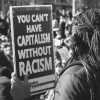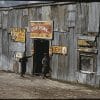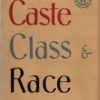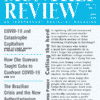
Modern U.S. Racial Capitalism
In recent years, “racial capitalism” has ascended across the humanities and social sciences. It has arisen as a conceptual framework to understand the mutually constitutive nature of racialization and capitalist exploitation, inter alia, on a global scale, in specific localities, in discrete historical moments, in the entrenchment of the carceral state, and in the era of neoliberalization and permanent war. | more…

Race Is About More Than Discrimination
Organized labor—based on white-exclusive and later white-dominated, though not necessarily exclusive, trade unions—formed itself as part of the settler state, not in the sense of being an apparatus of the state, but in the sense of accepting certain important precepts. The unions took for granted the nature of the settler state and, as such, conceived that the unions were to exist to serve the “legitimate” population, or at least the working class of the legitimate population. | more…

Poultry and Prisons
Poultry-processing work lies within a larger web of carceral geographies that extend beyond the prison walls into factory floors, neighborhoods, and schools. These geographies depend on and are produced through racism, as the production of unequal vulnerability to premature death. Racial capitalism connects the poultry plant to the prison alongside the movement for abolition beyond the prison. | more…

Colonialism, Migration, Pandemic
Capitalism is a global racialized structure. Although many of the exploited working class are white peoples, people of color, especially women of color, have generally borne the brunt of the human suffering inflicted by capitalism. There is no doubt that colonialism and U.S. slavery were economic systems, but they were also brutal attacks on non-Western peoples. | more…

The Yellow Plague and Romantic Anticapitalism
COVID-19 is a great revealer, laying bare the structures of racial disposability that have sacrificed people, from migrant detainees to meat packers. We are also witness to the rise of anti-Asian violence. Brutal attacks against Asian Americans have exposed the fraudulence of the model minority myth and the assimilationist paradigm that legitimizes state violence against Black and Brown bodies. | more…

Racial Capital from Pan-Africanism and Coloniality to Epistemic Rupture
The history and nature of racial capitalism remain primary questions of our times. Its true significance and gravity threaten to reveal everything about our contemporary world, from our immediate social arrangements to the global system. Within this, corporate power and the hegemonic culture shape the world at the limits of our perceptions. We must simultaneously engage the contemporary politics of knowledge production around these issues, both within the academy and in popular culture. | more…

Oliver Cromwell Cox’s Marxism
Oliver Cromwell Cox insisted on dealing with the crucial issues of his time and on telling the truth as he saw it, regardless of whose toes may have been stepped on or whose sensibilities may have been injured. He has aided in preventing the complete stultification of academic social science and in the long run exercised an immense influence on American life. | more…

Marx and Slavery
The rise to prominence of analyses of racial capitalism represents a breakthrough in Marxian theory. This has necessarily been accompanied by a critique of previous Marxian analyses, which all too often ignored or minimized the relation of slavery to capitalism. In recent years, however, these criticisms of orthodox Marxist treatments of slavery have been extended, much more problematically, to the work of Karl Marx himself. Although Marx never wrote a treatise on slavery, the issue of slave labor was woven into his analysis of social formations, both ancient and modern, and was inextricably intertwined with his treatment of wage labor. | more…

June 2020 (Volume 72, Number 2)
The current massive oil glut is the product of the effects of the tight oil or shale oil revolution, which for a time turned the United States into the biggest oil and gas producer in the world. Now, suddenly as a result of an overproduction of world oil, made far worse by the sudden falloff in demand due to the COVID-19 pandemic, we are witnessing the possible euthanasia of the U.S. tight oil industry, bleeding cash even before the oil price collapse and encumbered with mountains of debt. | more…

COVID-19 and Catastrophe Capitalism
Since the late twentieth century, capitalist globalization has increasingly adopted the form of interlinked commodity chains controlled by multinational corporations, connecting various production zones, primarily in the Global South, with the apex of world consumption, finance, and accumulation primarily in the Global North. COVID-19 has accentuated as never before the interlinked ecological, epidemiological, and economic vulnerabilities imposed by capitalism. | more…
How Che Guevara Taught Cuba to Confront COVID-19
Overcoming the HIV/AIDS and Special Period crises prepared Cuba for COVID-19. Aware of the intensity of the pandemic, Cuba knew that it had two inseparable responsibilities: to take care of its own with a comprehensive program and to share its capabilities internationally. | more…

The Brazilian Crisis and the New Authoritarianism
Three decades after liberal democracy replaced the military dictatorship of 1964–85, the far right in Brazil has made a comeback, most starkly with the electoral victory of Jair Bolsonaro in 2018. Bolsonaro, however, is not an isolated individual; rather, his government is characterized by an authoritarian style of neoliberalism built on a series of alliances, a prominent one of which is with the judiciary. This coalition boasts connections with the military and police forces, the evangelical religious right, and agribusiness. | more…

German Deunification
In 2021, Angela Merkel’s fourth and last term as the chancellor of Germany will end. To understand Merkel’s domestic and foreign policy, one must understand the country she inherited. She came to power in 2005 following the first center-left government since 1982, the government of Gerhard Schröder, and was in the fortunate position of becoming chancellor after a coalition government of social democrats and Greens had done the devil’s bidding of implementing very unpopular neoliberal policies to the sole benefit of German capital and the rich. | more…